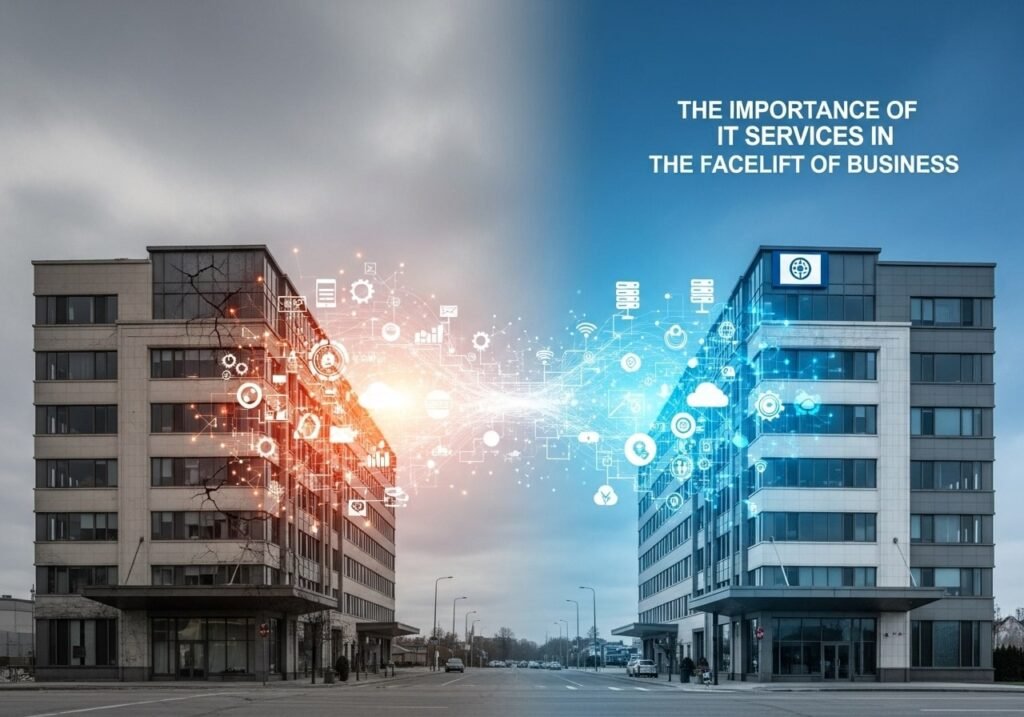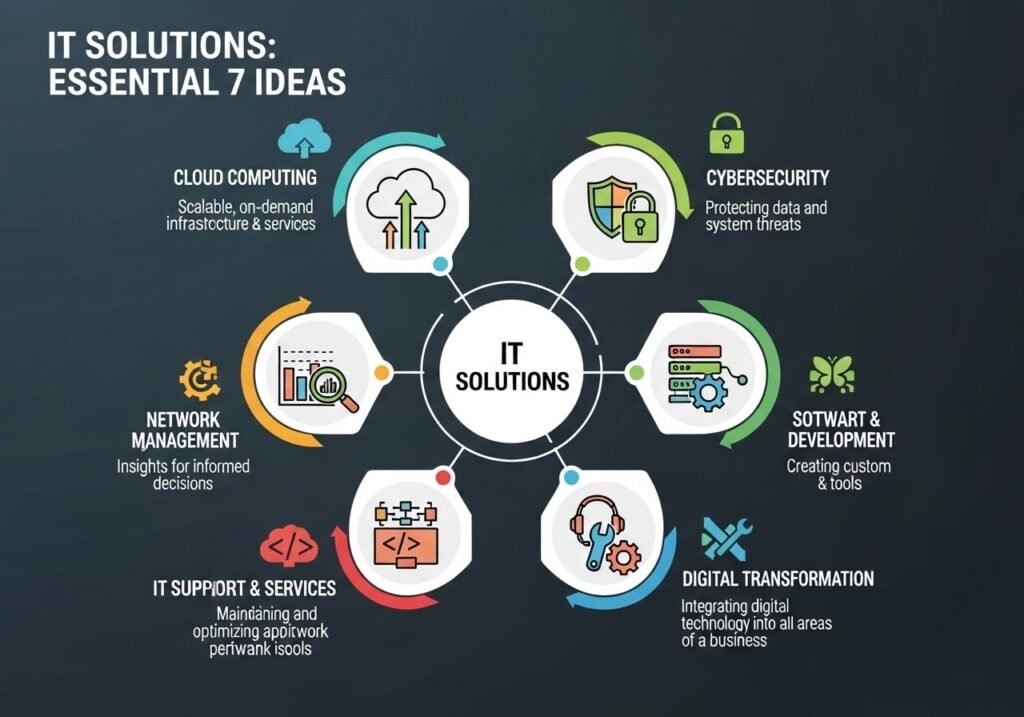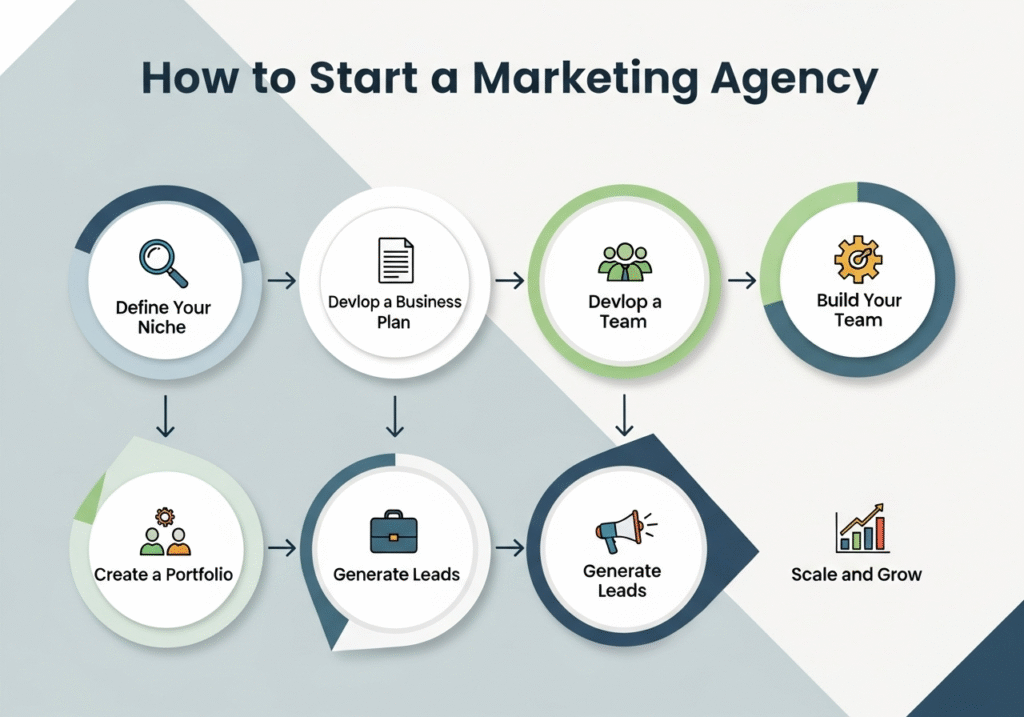Knowledge of Information Technology in Contemporary Business Technology is at the heart of how we conduct business, and organizations constantly need to modernize, move faster, and get ahead.
What are IT solutions is a word that everyone’s using, but what does it really mean? At the core, IT solutions for enterprises consist of a number of services, tools, and systems that help businesses to overcome their challenges associated with technology and use it in an effective and productive manner.
Here, in this article, let us look deeper into the idea of IT solutions, uncovering about its types, advantages, and how important it has become for every other contemporary business.
We are going to look at the diverse range of IT solutions, from infrastructure management to cloud services and how they can meet business requirements. We will also take on frequently asked questions about the IT customer and how it can streamline business operations.
Introduction To what are it solutions
IT solutions is a general term that covers various services and technologies, intent on addressing certain business issues concerning information technology.
These solutions may include simple software utilities up to sophisticated control and infrastructure systems. The main objective of IT solutions is to optimise the business using technology.
In many cases, companies turn towards IT because they wish to stay competitive or want to achieve a more efficient way of working – even sharpen management focus by erasing niggling pain points.
From updating obsolete software, protecting business data, or moving toward cloud-based platforms, IT solutions are the key to keep an organisation running in the 21st century.
Citation: The IT function can be handled internally or contracted out to service providers. Either way, IT services are crucial to keep a business competitive in today’s rapid digital environment.
Types of IT Solutions
The phrase ‘IT solutions’ is rather broad and covers many services. Following are some typical IT services that businesses need to operate efficiently today.
2.1 What are IT solutions and Managed
What does managed IT services entail? Managed IT services is the practice of outsourcing proactive, preventative, and reactive maintenance as well as daily tasks to a third-party provider that manages these responsibilities for your company.
These services include network management, system monitoring, data storage backup, and advanced troubleshooting. Small and medium-sized businesses often find managed IT either very convenient or a life-saver, especially if they can’t afford to establish an entire in-house IT team.
Managed IT services provide businesses the luxury of concentrating on what they do best while leaving the technical details to other specialists. The provider takes care of managing the company’s IT, keeping it in top shape and secure.
2.2 Cloud Solutions
Cloud computing has changed entirely the way companies manage and store their data. What are cloud solutions? Cloud solutions give you on-demand access to a shared pool of computing resources, such as servers, storage, databases, and software apps. Businesses don’t have to spend on costly physical infrastructure.
With a scalable and flexible cloud solution, it is cost-effective for any size of business. Public cloud providers such as Amazon Web Services (AWS), Azure Microsoft, and Google Cloud provide all sorts of services, which can range from storing files to analyzing data and from machine learning to much more.
2.3 Security Solutions
Among the key points of any IT strategy is cybersecurity. Security solutions defend or protect companies from cyber threats like malware, hacking, phishing, and data breaches. These can include firewalls, encryption, antiviral software, and detection of intruders.
Given the heightened volume and severity of cyberattacks, using strong security is now a necessity, not an option. IT security professionals design these solutions to help protect corporate data, enforce compliance, and minimize the risk of damage caused by a breach which could result in financial loss or damaged reputations.
2.4 Software Development Solutions
Software development services entail the design and customization of software applications to fulfill a company’s particular requirements. These solutions can be everything from mainstream software to custom-made software which has been created specifically.
Companies may require to build bespoke software applications for a variety of reasons such as better efficiency, increased customer satisfaction, or integration with other systems.
Software development is frequently a joint effort between IT and business in order to provide the end product that users need. Software development solutions like CRM, ERP, and inventory management software.
2.5 IT Consulting and Strategy
IT consulting is the practice of staying in touch with experts to devise an approach whereby a company’s IT stance is consistent with the objectives of that business.
Consultants evaluate all the current IT infrastructure, determine where the holes are, and recommend what needs to be done to get better performance, security, and scalability. Consulting and IT are also critical when companies aim to maximize the value of their IT investments or start digital transformation projects.
Services an IT consultant might provide include conducting technology audits, developing the strategic roadmap, system integration services, process optimization, and operations assistance. Solutions in these areas are extremely customized based on the size and nature of each business, as well as its individual challenges.
The Importance of IT Services in The Facelift of Business

For businesses, IT solutions are becoming the main drivers for change in the digital world. They allow companies to adopt new technology, reduce bureaucracy, and make better decisions.
For instance, cloud services enable organizations to interact with data and applications in a variety of locations, promoting greater collaboration and business agility. In addition, IT applications enable businesses to collect and process information enabling them to make more informed decisions.
Business intelligence software and advanced analytics allow organizations to gain useful insights about their operations, customer activities, as well as market trends.
At the end of the day, IT solutions are work that makes business more agile in responding to market opportunities while keeping ahead of their competition. Either through automation, better customer interaction or streamlining data processes, IT branded solutions enable organizations to achieve the business transformation they deserve.
Benefits of Implementing what are it solutions
IT solutions have a number of advantages that can change the way a business does their work. Here are just a few of the big benefits:
4.1 Improved Efficiency and Productivity
Simplify process and save time Automation is the name of the game when it comes to IT solutions that make business run faster, better. You can do hours of work with software applications in minutes, decreasing the possibility of human error and making you more productive.
4.2 Cost Savings and Scalability
Cloud offerings, for example, enable enterprises to forego the significant upfront investments in building and maintaining IT. Alternatively, companies can be charged for only what they consume, which is more cost-efficient.
What is more, IT technologies such as cloud computing are very scalable and companies can stretch and contract their resources to match reaching requirements without investing in new physical infrastructure.
4.3 Advanced Security and Risk Control
Security solutions guard against all these kinds of attacks and threats, keeping businesses protected against cyber risk which may result in financial loss and damage of goodwill. By adopting strong security mechanisms, enterprises can protect proprietary information, adhere to industry mandates, and reduce risk.
Critical Points When Selecting IT Services To Suit Your Business
Selecting the correct IT solution for your company can be overwhelming. With multiple considerations to take into account, such as:
- Business Problems: What problems do you wish to solve? Would you like to increase security, digitize processes or inspire collaboration? Once you recognize what your business needs are, it will be easier to focus on the solutions.
- Scalability: Will your IT solution handle increasing business? Ensure the solution you select can handle any future expansion.
- Cost: Take the implementation, maintenance, and support into consideration. Pick solutions you can afford, but that still meet your business needs.
Typical IT Challenges and How IT Solutions Can Help
IT can be a challenge for many companies with everything from outdated systems to security issues and inadequate data management. IT services can combat these challenges by placing the proper technology in the hands of businesses, helping them update their infrastructure, secure their network, and streamline how they manage data.
For instance, legacy businesses can gradually shift to cloud-based services to dump the older hardware and software systems. The business enterprises dealing with cybersecurity issues on the other hand can get a strong end-to-end security system deployed in its entire network to ward off any potential risk.
The Future of IT Services: Trends to Watch
The landscape of IT solutions is always shifting with new technologies and trends coming into play frequently. Here are some of the top trends to keep an eye on:
- Artificial Intelligence and Machine Learning: AI and ML are being incorporated into IT offerings to automate decision-making, enhance customer experiences and distill insights from information.
- Edge Computing: As more and more of these IoT devices pop up, edge computing is taking off, allowing data to be processed closer to where it’s generated so we get insights more quickly.
- Blockchain: Blockchain is starting to make inroads in different sectors, providing secure, transparent, and decentralized transactional and data-storage capabilities.
Conclusion
You can’t succeed in today’s digital world without IT solutions for your business. A good IT strategy could lead to productivity enhancement, cost reduction, and information security for businesses who can then leverage the same as a competitive advantage.
Whether it is through managed services, cloud computing, or cybersecurity, IT solutions are crafted to solve particular business problems and promote your business growth.
The importance of IT solutions in shaping the future of businesses across the globe will only grow stronger as technology keeps on advancing. In order to get ahead, companies need to thoughtfully consider their own IT requirements and invest in technologies that support their businesses.
FAQs
What are IT solutions?
As used herein, the term “IT solutions” is intended to encompass a variety of services and technologies that businesses use to tackle problems in the realm of information technology. These services include IT support, cloud computing, cybersecurity, software development, and consulting.
What’s the importance of IT solutions for businesses?
IT services are crucial in the sense that they enable businesses to be more efficient, cost-effective, secure, and competitive in a fast-paced digital environment.
How can I find my business IT solution?
When it comes to selecting the best IT solution, take a look at your business needs and determine how well scalability, costs, and where you will be five years down the road match up with what an option can provide.
What are the advantages of IT services?
The major advantages of IT solutions are increased productivity, cost-savings, security, and scalability to the power to drive an organization’s journey on technology.
What are some IT solutions trends that businesses will be looking out for?
Some IT solutions trends include AI, machine learning, edge computing, and blockchain, which are making an impact across various industries.



